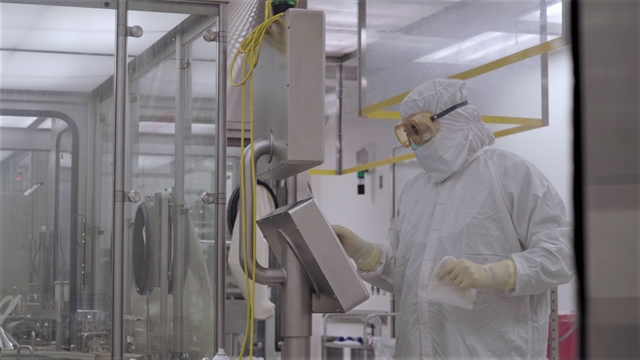 Society
Society

New data from Public Health England (PHE) has demonstrated that the AstraZeneca COVID-19 vaccine offers high levels of protection against the Delta variant (or B.1.617.2, formerly known as the Indian variant), AstraZeneca has said.

|
| An image taken at a vaccine production and manufacturer facility. — VNS Photo Courtesy AstraZeneca |
HCM CITY — New data from Public Health England (PHE) has demonstrated that the AstraZeneca COVID-19 vaccine offers high levels of protection against the Delta variant (or B.1.617.2, formerly known as the Indian variant), AstraZeneca has said.
Real-world data demonstrated two doses of the vaccine were 92 per cent effective against hospitalisation due to the Delta variant, and showed no deaths among those vaccinated.
The vaccine also showed a high level of effectiveness against the Alpha variant (B.1.1.7; formerly known as the ‘Kent’ variant) with an 86 per cent reduction of hospitalisations and no deaths reported.
The data suggested that vaccine effectiveness against milder symptomatic disease, although significant, was lower. Vaccine effectiveness against symptomatic disease was 74 per cent against the Alpha variant and 64 per cent against the Delta variant.
The higher efficacy against severe disease and hospitalisation is supported by recent data showing strong T-cell response to the COVID-19 AstraZeneca vaccine, which should correlate with high and durable protection.
Mene Pangalos, Executive Vice President for BioPharmaceuticals R&D, said: “This real-world evidence shows that the AstraZeneca vaccine provides a high level of protection against the Delta variant, which is currently a critical area of concern given its rapid transmission. The data show that the vaccine will continue to have a significant impact around the world given that it continues to account for the overwhelming majority of supplies to India and the COVAX facility.”
The analysis included 14,019 cases of the Delta variant, 166 of whom were hospitalised, between April 12 and June 4, looking at emergency hospital admissions in England.
The real-world evidence against the Delta variant, was based on limited follow-up after the second dose, which could impact the effectiveness estimate.
The AstraZeneca vaccine was co-invented by University of Oxford and its spin-out company, Vaccitech. It uses a replication-deficient chimpanzee viral vector based on a weakened version of a common cold virus (adenovirus) that causes infections in chimpanzees and contains the genetic material of the SARS-CoV-2 virus spike protein. After vaccination, the surface spike protein is produced, priming the immune system to attack the SARS-CoV-2 virus if it later infects the body.
The vaccine has been granted a conditional marketing authorisation for emergency use in more than 80 countries across six continents. More than 500 million doses of the AstraZeneca vaccine have been supplied to 165 countries, including more than 100 countries through the COVAX Facility. — VNS




